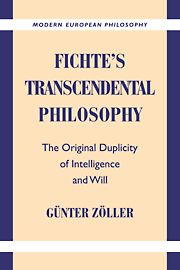Introduction
Published online by Cambridge University Press: 05 June 2012
Summary
Thinking is doing.
Joseph BeuysIn 1800 Johann Gottlieb Fichte, then thirty-seven years of age and without a post after having lost his professorship at the University of Jena over charges of atheism during the previous year, published a treatise whose title can suitably be placed over its author's entire oeuvre: Die Bestimmung des Menschen, customarily translated as “The Vocation of Man,” but perhaps best rendered in English as “The Destination of Humanity.” The keyword of the work's German title, “Bestimmung,” can mean both “determination,” in the sense of an imposed limitation, and “calling” or “vocation,” indicating the goal of some pursuit. Fichte's employment of the term in its finitistfinalist double meaning addresses the tension between what is fixed or given in human existence and what is open and yet to be realized about it. As Fichte sees it, the goal for which human beings are destined is not given to them like a determination that would limit them from the outside. Rather, the destination of the human being is precisely the freedom from all determinations except the ones that the human being gives to itself freely. Determination is to become self-determination, facticity is to be worked off through freedom.
Fichte's basic belief in the supreme value of free self-determination runs through virtually his entire life and works, manifesting itself in his notoriously controversial public persona as well as his philosophical thinking on such diverse subjects as politics, law, ethics and religion.
- Type
- Chapter
- Information
- Fichte's Transcendental PhilosophyThe Original Duplicity of Intelligence and Will, pp. 1 - 8Publisher: Cambridge University PressPrint publication year: 1998

